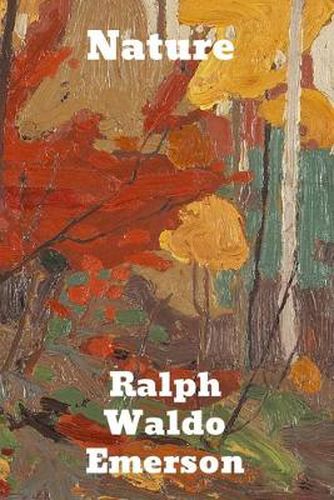Readings Newsletter
Become a Readings Member to make your shopping experience even easier.
Sign in or sign up for free!
You’re not far away from qualifying for FREE standard shipping within Australia
You’ve qualified for FREE standard shipping within Australia
The cart is loading…






This title is printed to order. This book may have been self-published. If so, we cannot guarantee the quality of the content. In the main most books will have gone through the editing process however some may not. We therefore suggest that you be aware of this before ordering this book. If in doubt check either the author or publisher’s details as we are unable to accept any returns unless they are faulty. Please contact us if you have any questions.
Nature, by Ralph Waldo Emerson, is a superb nature essay and a philosophical interpretation of nature and how it influences man physically and spiritually. Emerson’s writing is redolent with the wonder of the true romantic, but never sinks to the level of maudlin fluff.In the essay Emerson put forth the foundation of transcendentalism, a belief system that espouses a non-traditional appreciation of nature. Transcendentalism suggests that the divine, or God, suffuses nature, and suggests that reality can be understood by studying nature. Emerson’s visit to the Museum National d'Histoire Naturelle in Paris inspired a set of lectures he later delivered in Boston which were then published.Within the essay, Emerson divides nature into four usages: Commodity, Beauty, Language and Discipline. These distinctions define the ways by which humans use nature for their basic needs, their desire for delight, their communication with one another and their understanding of the world.Emerson followed the success of Nature with a speech, The American Scholar , which together with his previous lectures laid the foundation for transcendentalism and his literary career.
Ralph Waldo Emerson (May 25, 1803 - April 27, 1882)[5] was an American essayist, lecturer, philosopher, and poet who led the transcendentalist movement of the mid-19th century. He was seen as a champion of individualism and a prescient critic of the countervailing pressures of society, and he disseminated his thoughts through dozens of published essays and more than 1,500 public lectures across the United States.Emerson gradually moved away from the religious and social beliefs of his contemporaries, formulating and expressing the philosophy of transcendentalism in his 1836 essay Nature . Following this work, he gave a speech entitled The American Scholar in 1837, which Oliver Wendell Holmes Sr. considered to be America’s intellectual Declaration of Independence.
$9.00 standard shipping within Australia
FREE standard shipping within Australia for orders over $100.00
Express & International shipping calculated at checkout
This title is printed to order. This book may have been self-published. If so, we cannot guarantee the quality of the content. In the main most books will have gone through the editing process however some may not. We therefore suggest that you be aware of this before ordering this book. If in doubt check either the author or publisher’s details as we are unable to accept any returns unless they are faulty. Please contact us if you have any questions.
Nature, by Ralph Waldo Emerson, is a superb nature essay and a philosophical interpretation of nature and how it influences man physically and spiritually. Emerson’s writing is redolent with the wonder of the true romantic, but never sinks to the level of maudlin fluff.In the essay Emerson put forth the foundation of transcendentalism, a belief system that espouses a non-traditional appreciation of nature. Transcendentalism suggests that the divine, or God, suffuses nature, and suggests that reality can be understood by studying nature. Emerson’s visit to the Museum National d'Histoire Naturelle in Paris inspired a set of lectures he later delivered in Boston which were then published.Within the essay, Emerson divides nature into four usages: Commodity, Beauty, Language and Discipline. These distinctions define the ways by which humans use nature for their basic needs, their desire for delight, their communication with one another and their understanding of the world.Emerson followed the success of Nature with a speech, The American Scholar , which together with his previous lectures laid the foundation for transcendentalism and his literary career.
Ralph Waldo Emerson (May 25, 1803 - April 27, 1882)[5] was an American essayist, lecturer, philosopher, and poet who led the transcendentalist movement of the mid-19th century. He was seen as a champion of individualism and a prescient critic of the countervailing pressures of society, and he disseminated his thoughts through dozens of published essays and more than 1,500 public lectures across the United States.Emerson gradually moved away from the religious and social beliefs of his contemporaries, formulating and expressing the philosophy of transcendentalism in his 1836 essay Nature . Following this work, he gave a speech entitled The American Scholar in 1837, which Oliver Wendell Holmes Sr. considered to be America’s intellectual Declaration of Independence.